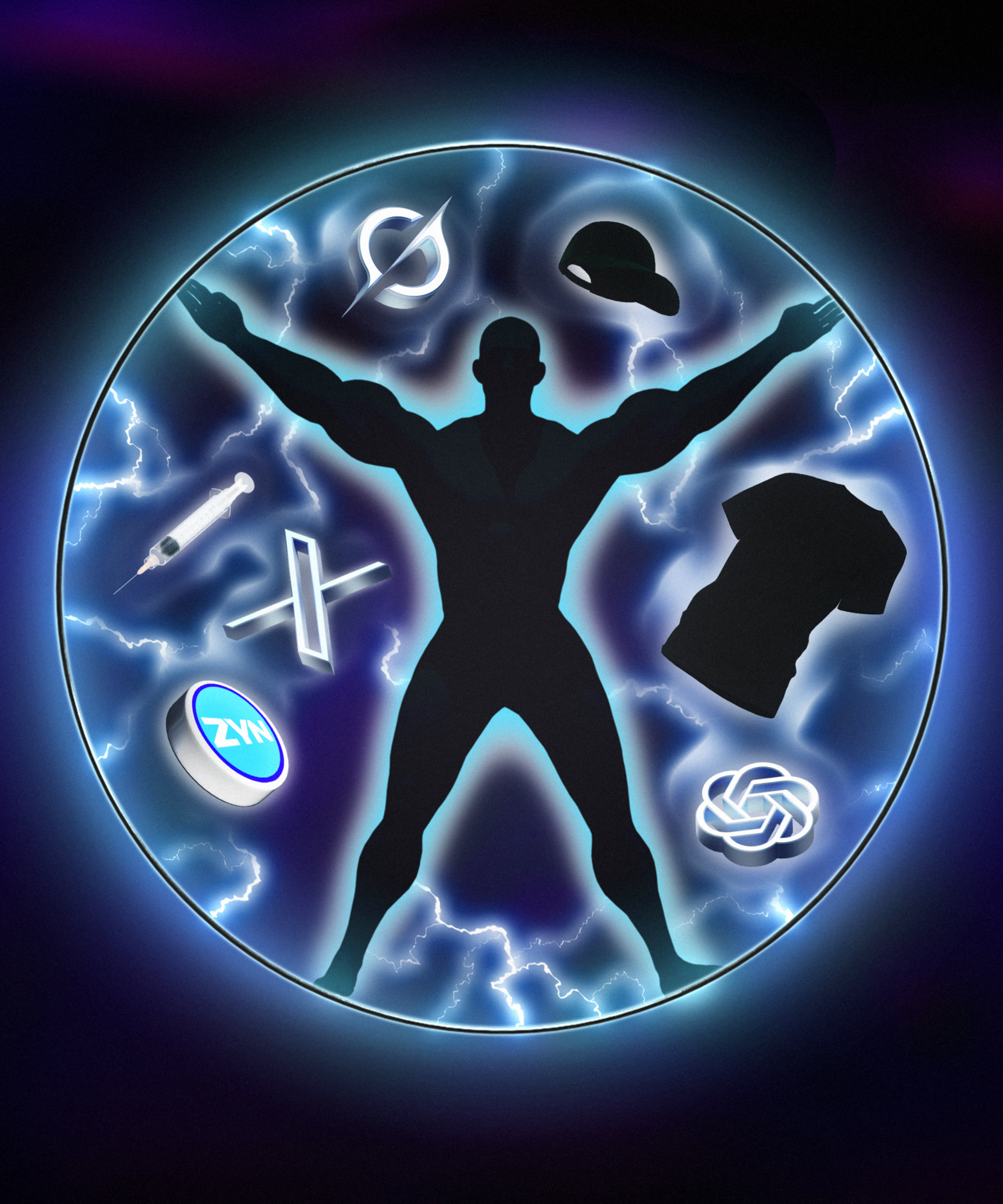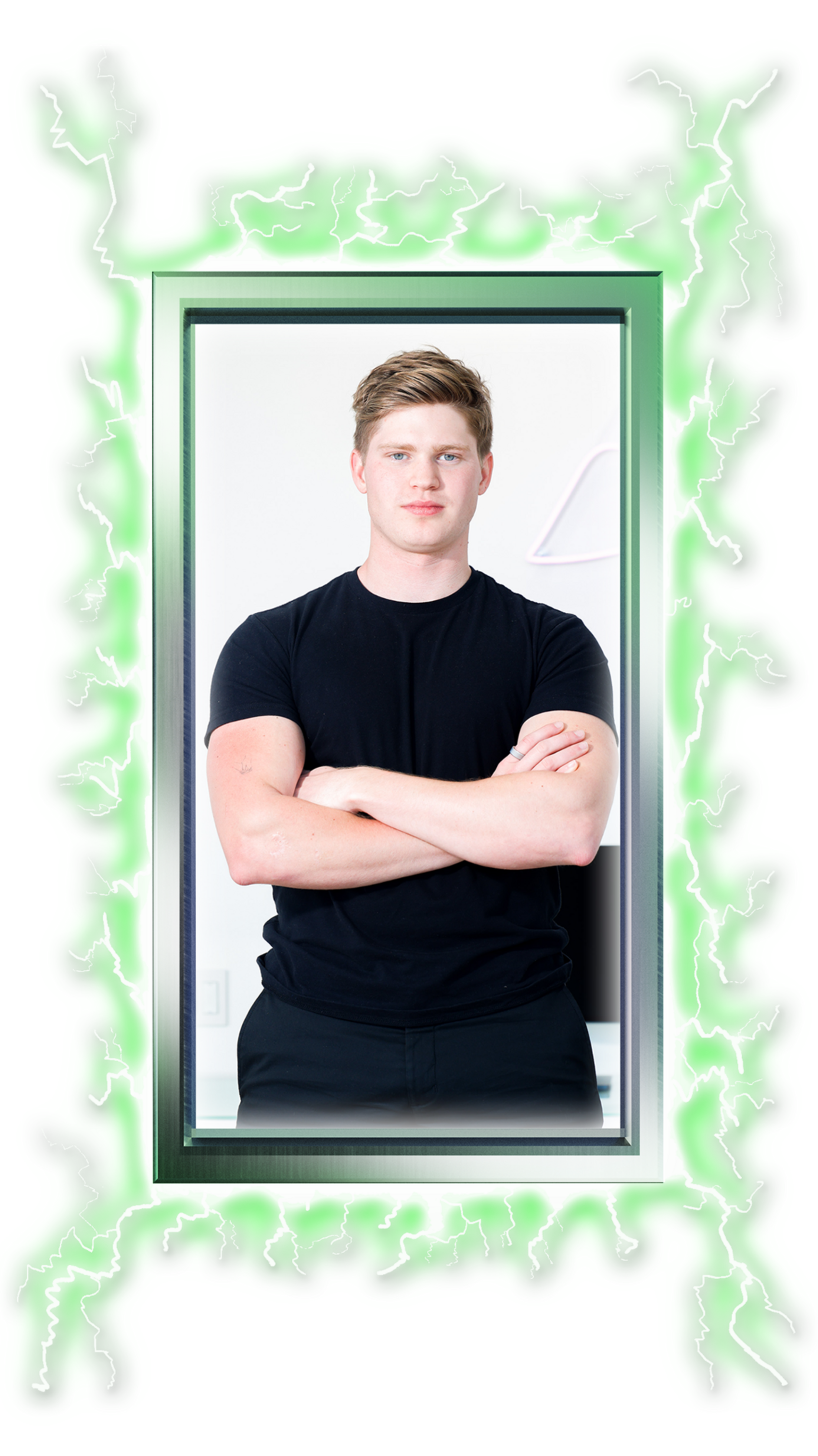The tech bro you once knew is dead.
Gone are the pale, lanky nerds in branded hoodies, cranking out code from a Google beanbag. Forget the Soylent-sipping, socially awkward kids barely looking up from their laptops at the wider world.
Tech bro 2.0 is jacked, cracked, and serving uncomfortably intense eye contact. He’s a prolific tweeter, an occasional coder, and a full-time believer that the AI-pocalypse is coming. He’s far less HBO’s “Silicon Valley” and much more HBO’s “Mountainhead.”

Inside the lives of Silicon Valley’s young hustlers
We would know. To understand the heart and soul of the tech bro in 2025, The Standard interviewed nearly two dozen male founders and self-professed tech bros, ages 21 to 30. We asked candid questions about their work and fitness routines, relationships and sex lives, and political and philosophical beliefs. We also spoke to longtime Silicon Valley figures about changes to the tech bro archetype they’ve tracked over the decades.
Of course, no community is a monolith, and tech bros barely constitute a community. But the conversations revealed a detailed picture of what the nouveau specimen looks like in the “hard tech” era, defined by capital-intensive pursuits in AI, defense tech, and space exploration. Whereas the last decade was characterized by utopian ideas about technology’s potential and consumer apps for sharing photos, finding dates, and hailing rides, this one is markedly more cynical and hard-edged.
“It does feel like there’s a little bit of nihilism in the air,” said Jayden Clark, 27, cofounder of Gecko, a platform for rental businesses. Hence, tech bros are “taking every single substance to try and get a cognitive edge. Or taking a bunch of recreational drugs on the weekend because, like, whatever, nothing matters, right? Empty the 401(k), AGI is coming soon.”

The portrait that emerges in conversation is more akin to that of a soldier of fortune than the world-changing nerd of yesteryear. The bros we spoke to hit the gym daily and champion American dominance. They fine-tune their bodies for the sole purpose of working more, injecting peptides every morning, using nicotine patches or lozenges for focus, and meticulously tracking their sleep with Oura rings and Eight Sleep smart beds.
They’re more “based” and less Burner. They’ve got rizz (charisma) and a touch of tiz (autism). Many report wanting to have lots of kids, and a handful are convinced they’re going to live forever. Perhaps the biggest change is that “tech bro” is no longer a pejorative.
“It used to be an insult, but now it feels like us tech bros, we’ve reclaimed it in a way,” said Silen Naihin, 23, founder of AI sales startup Endflow.

The Standard is dedicating this week to unpacking a group that’s quickly coming to define our era. We’ll examine their inner worlds, surface their ambitions, and detail their obsessions.
Each day, we’ll publish a window into their world, from their pursuit of peak wellness and quixotic quest for girlfriends to their relentless work routines and the new vocabulary that peppers their speech. But we must start at the beginning.
Enter the technology brother
Once upon a time, Bay Area techies were perceived as oddball bohemians who disavowed corporate America. “In the 2000s, the trope was a sweet but insecure man who was good at engineering and led something akin to an artist’s life,” said Eric Bahn, a longtime Silicon Valley investor.
But as the post-Great Recession startup boom kicked into high gear, Patagonia-vest-wearing “finance bros” ventured west to seek new fortunes. According to Google Trends (opens in new tab), the term “tech bro” spiked in use after Facebook IPOed in 2012, becoming shorthand for the brash young men who built apps with the mantra “move fast and break things,” oblivious to the social and political wreckage left behind. The term was first listed (opens in new tab) in Urban Dictionary in 2013.
By the close of the decade, “tech bro” had become a cultural insult with a reach so broad that it was a lazy shorthand (opens in new tab) for almost anyone — founders, investors, even politicians — who embodied the Valley’s most dickish impulses.
Today, the diss has morphed into a badge of honor. It’s part of a cultural shift that includes Mark Zuckerberg’s hypebeast glow-up, Elon Musk’s Dogefather era, and the rising popularity of the podcast “TBPN” (originally called “The Technology Brothers”).

“It’s become a powerful thing to be a tech bro,” said One Chowdhury, 24, CEO of AI sales management startup Octolane. “You work with AI, LLMs, hard tech, and missiles. You know Republicans, Democrats, everything that’s happening in politics. You can influence the government. Tech bros are the new superstars.”
That stardom comes with new expectations. “There’s been an influencer-ization of the tech bro,” said Marwan Refaat, 25, a former founder and investor at Fractal Capital.
For some, going viral is a deliberate business strategy. Others see developing a larger-than-life online persona as a way to attract investors and employees.
Being a modern tech bro is “about playing these subtle status games,” said Zach Dive, 26, cofounder of Adam, an AI hardware design startup. “Like being in great shape, like having a crazy number of Twitter followers, like hosting parties that have a good ratio of men and women.”
Mercenaries not missionaries
Once celebrated for their technical prowess, tech bros no longer earn reverence for coding alone because of the rise of AI tools that can do the job for them. As the skill becomes less distinctive, founders are increasingly rewarded for their softer skills.
Arielle Zuckerberg, general partner at Long Journey Ventures and Mark’s sister, said she seeks out founders who have both “rizz and tiz.”
“If you are all tiz and no rizz, that’s just not enough,” Zuckerberg said. “You have to be this magnetic human who can attract talent and be really excellent at fundraising.”
For this new generation of tech bros, the Obama-era optimism of the 2010s simply does not exist. This crop of Gen Z founders are coming of age in a “woke recession,” according to tech journalist-turned-investor (and regular Standard contributor) Josh Constine, in which defense tech is celebrated and an 1980s-era Wall Street conservative aesthetic is returning to the mainstream. “Generally, there’s a more purely capitalistic attitude, rather than one focused on inclusive mission and impact, like before,” Constine said.

Bahn concurs. “Founders are more Ayn-Randian,” he said. “And there’s a much more ostentatious display of wealth.”
When asked what company they’d want to work at if they weren’t building startups, only one of 20 tech bros we spoke to mentioned a Big Tech classic (Meta). The most common answers were Anduril, Palantir, OpenAI, and Anthropic. Many founders said that they haven’t thought about diversity, equity, and inclusion in years.
“It’s kind of stupid,” one 25-year-old said. “And everyone I know who runs a company thinks that.” An investor added that founders increasingly use phrases like “that’s so retarded” and “that’s so gay” — something he rarely encountered in the 2010s.
None of the founders told us which political party they support. “I’m not hugely political,” said Dive, who grew up in the U.K. “Whatever Garry Tan’s opinion is is probably a good one,” he added, referencing the Y Combinator CEO who has funneled more than $400,000 (opens in new tab) to moderate politicians and causes in San Francisco over the last few years.
Nathalie Gouailhardou, cofounder of Neurode, said she has witnessed the tech bro swerve to the right in San Francisco. Both she and a friend were dating male founders who initially said they voted for Kamala Harris, only to later reveal that they voted for Donald Trump.

Traditional values, too, are on the rise. As Musk (whom half the bros listed as their tech idol) ruminates on impending population collapse, a majority said they want to have three or four kids.
But do they have romantic partners? Absolutely not. Most of the bros we interviewed are single, work all the time, and don’t use dating apps. “I probably talk to LLMs like 10 times more than I talk to people,” said Jake Adler, 21, founder of defense biotech startup Pilgrim.
Many have forsaken alcohol and vacations to “lock in” before AGI arrives and upends the future. “This is the last chance to build generational wealth,” said Sheridan Clayborne, 25, cofounder of AI recruiting firm Brix. “You need to make money now, before you become a part of the permanent underclass.”
Another group is finding every possible way to optimize their health so they can live forever once AGI is invented. “I think there’s a good chance that if you’re under the age of 40, you won’t die, especially if you have money,” Naihin said.
The old tech bro is dead — but the new one might just be immortal.